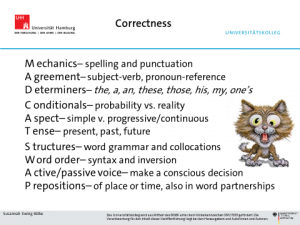By now, nearly every writer, educator, and business executive in the world has written about how important it is to recognize and overcome obstacles, to see failure as a step on the way to success, and learn from one’s mistakes. It is generally accepted that errors are a part of life, and should be accepted as such. Yet, they are often the reason for unsatisfactory results on tests and tasks of every kind. How can you, in spite of the last, find your way as a language learner who is bound to make a variety of mistakes?
It is general knowledge that young children go through developmental stages in their language acquisition as in all other parts of their development. As they do, they make all sorts of mistakes along the way. And yet they are able to overcome these and grow into mature masters of their mother tongues. Though you probably did not begin learning English until your brain lost some of that miraculous malleability that make it so easy for children to learn, you can, like those children, overcome the errors in your language production by listening and practicing more. Children are constantly receiving gentle correction in the form of increased language input, but they are also learning from misunderstandings. You can do the same!
In the course of your studies, you should be receiving detailed feedback on your work, too. The language errors you make will at the very least be marked with a red pen. This is the task of your instructors. Where their work ends, yours begins. You need to look carefully at feedback you receive and incorporate it into your learning immediately as an opportunity for reflection. There are a few possible outcomes here.
If it is clear what the problem is, keep track of it, and take some time to do several things: note your mistake, and the correct form. Make sure you understand entirely the rule that regulates this structure and ideally write yourself several examples of it, practicing it productively. The more often you force yourself to do it correctly, the less likely you are to make the same mistake again.
If you don’t understand what is wrong with the marked word/passage/form, there are other things to do.
- Look it up. Can you find in a dictionary, a grammar book or an online reference the marked language and the patterns regulating its form and use?
- If you cannot find the information, or still don’t understand it, ask the lecturer or professor who marked it. Request concrete feedback at every opportunity from your instructors. We adults are less cognitively flexible than children, and learn better if we actually understand the background of our errors. Be sure to ask as well if something marked red is categorically inaccurate, or perhaps rather ambiguous or a question of the right style. These issues will still impact the assessment of that particular assignment, but have different consequences for your future learning. Key point here: Instructors are generally glad to receive such inquiries, rather than put out at the time spent. It is always rewarding to know your feedback is being taken seriously!
Finally, last but not least, keep track of your errors. In the end, you know better than anyone else what your typical stumbling blocks are, whether it is the present perfect verb form, verb-preposition combinations, or Germanized expressions, for example. Don’t just lean back and say, oh, well, I’m never going to get that right without help, or the computer can correct it next time. Remember your difficulties, and plan accordingly. Remember to always proofread your work. No professional writer has ever published her or his very first draft: revision is key to any kind of writing. Regardless how little time you might have for an assignment, always budget time for this phase of the writing process.
A colleague and I have developed a mnemonic that might help you remember what to look for as you look over your own writing. Use it, or one that better reflects your own challenges in language accuracy.



